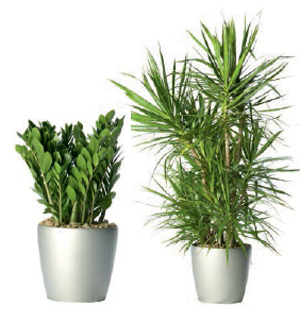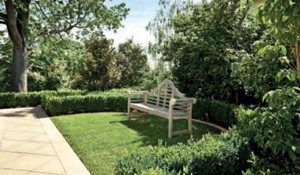
IWords: Catherine Stewart
Ever feel like your life is out of kilter? That you’re spending most of your time rushing here and there without being quite sure what you’re achieving or you’re left wondering why, when you’ve lots of friends and family, you still often feel strangely sad or alone? Improving your plant-life balance may be the answer.
Gardeners have long known a secret — that nurturing and caring for plants, enriching the soil with compost, even struggling for years to make a garden in a barren wilderness is very, very good for the body and the soul. Whether it’s caring for just a tiny pot plant on your windowsill or managing an acre of ground, everyone can garden and reap the benefits.
Depression, or it’s less sinister but still unwelcome sister, melancholy, plagues many a modern life, with feelings ranging from of a lack of connection to recurring vague pains and illnesses. Our shelves groan with self-help books, and courses and “wellness” centres abound, extolling the virtues of everything from meditation and yoga to therapy and retreats — all no doubt useful in some way but all costing plenty in time and money. Many distil down to six common elements: live in the present, connect with nature, get physical, be creative, learn some patience and look after those who are worse off than yourself. I think you can find all those things outside in your garden or inside your home, if it’s filled with plants.
So how does a better plant-life balance improve both our physical and mental health and even bring a greater contentment and purpose to our lives?
Better minds
People who spend some time outside every day are less likely to suffer from depression, and those who are able to enjoy gardens filled with trees and beautiful plants report a more positive outlook on life. Caring for plants lowers stress levels and aids healing, with some researchers pinpointing the uncertain world of the garden as a good way for learning to deal with the ups and downs of life.
Gardening encourages mindfulness, where you learn to observe closely everything around you so that your mind becomes centred on the present. Take time when you’re gardening to focus on the smell of the earth, the feel of it between your fingers, the sounds of insects foraging among the flowers and the intricacy of every individual leaf.
But gardening is not just about the present; it’s also very much about the future and about planning and looking forward to change and growth. Planting a seed means a promise of future flowers or fruit and a reciprocal promise that you will be there to care for that plant, making a rewarding partnership where each relies on the other.
Nature’s unpredictability means no result in gardening is certain, so gardeners must cope with both good and disappointing results. But they are gentle lessons about learning new ways of doing things, getting advice and trying again that we can take into our everyday lives.
Creativity helps many people overcome mild depression. Designing and planning a garden combines the artistry of mixing shapes and colours with the practicality of making something beautiful out of a bare canvas with plants, soil and water.
Better sleeping
For those who have trouble getting to sleep at night, exposure to sunlight early in the morning is the best way to set yourself up for a good night’s sleep. An early morning “nurse’s round” in your garden is an ideal way to get yourself back on track. As you age, it’s often waking too early and falling asleep by afternoon that’s the problem, so try to stay out gardening in the late afternoon until dusk.
Better breathing
Potted plants can improve indoor air quality by reducing the airborne volatile organic compounds (VOCs) that are released from many modern-day carpets, fabric coatings, glues, plastics and paints. Results from the University of Technology Sydney show that the just a few good-sized pot plants scattered around your living area will host enough microorganisms in their root zone to gobble harmful VOCs while releasing oxygen, resulting in less headaches, fatigue, eye irritation and respiratory complaints.
Better learning
University of Michigan studies are showing that being outside, especially among plants, can increase memory retention by up to 20 per cent. Working and playing in a garden improves concentration, thinking skills and performance and children with ADD can really benefit. Find ways to improve the plant-life balance in your kids’ home and school environments, as it will stimulate concentration, reduce distraction and help them learn new things.
Better communities
Suburbs and towns filled with healthy gardens are better and safer places to live, and encourage social connections between neighbours, with research showing that people who spend a lot of time around plants tend to have better relationships with each other. Nurturing nature seems to encourage us to also nurture and care for each other, forming the basis for vibrant, compassionate and supportive communities. In an area filled with beautiful gardens, people also feel like they have a better quality of life, regardless of their real personal circumstances. There’s also less crime, as a community that seems to care about its physical and social environment discourages others from damaging it through graffiti, theft or more violent crime.
Better bodies
Natural environments make people feel more energetic and animated, bringing on a positive outlook to life. Apart from that mental stimulation, gardening is one of life’s natural exercises, from the more strenuous activities of digging, lifting and carrying through to medium-level exertions of pruning and weeding, or even the gentle rhythms of cutting fresh flowers, checking plants and watering. It’s free (unlike the gym), it’s easy to learn and experts all agree that healthy people are happier people.
Better eating
If you’re concerned about what you eat, there’s no substitute for picking it from your own backyard. Fresh from the garden to the table, it’s brimming with vitamins, fibre and antioxidants. Not to mention the flavour — everyone should know the satisfaction and sweetness your own fresh-picked strawberry brings thanks to nurturing; it adds hugely to how good it tastes.
So garden your desk and your windowsill, your lounge room and backyard, the nature strip, local park and school. Fill your world with plants and fill your soul with contentment.
Top indoor plants
• Madagascar Dragon Tree (Dracaena marginata)
• Zanzibar Gem (Zamioculcas zamiifolia)
• Yucca (Yucca elephantipes)
• Janet Craig (Dracaena deremensis)
• Fiddle-leaf Fig (Ficus lyrata)
• Bromeliads
• Peace Lily (Spathiphyllum)
• Mother-in-law’s Tongue (Sansevieria)
• Walking Iris (Neomarica bicolour gracilis)

















